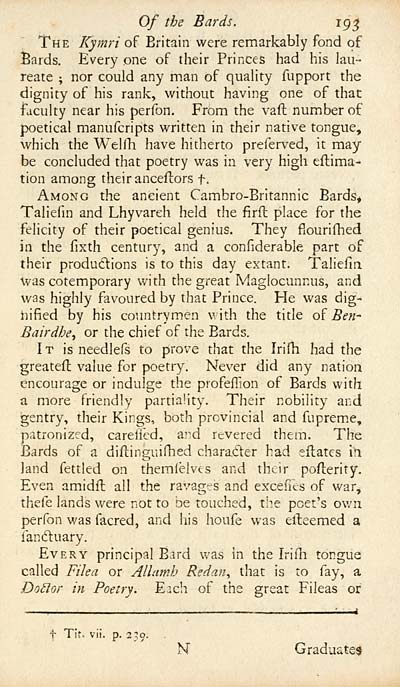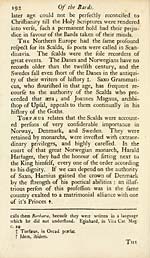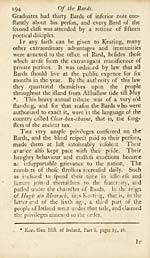Blair Collection > Critical dissertations on the origin, antiquities, language, government, manners, and religion, of the antient Caledonians, their posterity the Picts, and the British and Irish Scots
(231)
Download files
Complete book:
Individual page:
Thumbnail gallery: Grid view | List view

Of the Bards. ig^
The Kymri of Britain were remarkably fond of
Bards, Every one of their Princes had his lau-
reate ; nor could any man of quality fupport the
dignity of his rank, without having one of that
faculty near his perfon. From the vaft number of
poetical manufcripts written in their native tongue,
which the Welfh have hitherto preferved, it may-
be concluded that poetry was in very high eftima-
tion among their anceftors f.
Among tlie ancient Cambro-Britannic Bards*
Taliefin and Lhyvareh held the firft place for the
felicity of their poetical genius. They flourifhed
in the fixth century, and a confiderable part of
their produdions is to this day extant. Taliefin
\vas cotemporary vvith the great Maglocunnus, and
was highly favoured by that Prince. He was dig-
nified by his countrymen vith the tide o^ Ben-
Bairdhe^ or the chief of the Bards.
It is needlefs to prove that the Irifii had the
greatell value for poetry. Never did any nation
encourage or indulge the profeflion of Bards with
a more friendly partiality. Their nobility and
gentry, their Kings, both provincial and fuprem.e,
patronized, carelfcd, and revered them. The
Bards of a diftinguifhed character had eftates in
land fettled on themlelvts and their poflerity.
Even amidft all the ravages and excefics of war^
thefe lands v/ere not to be touched, tiie poet's ov/n
perfon was facred, and his houfe was elleemed a
lantftuary.
Every principal Bard was in the Irifh tongue
called Filea or Allamh Redan., that is to fay, a
Do^or in Poetry. Each of the great Fileas or
+ Tif, vii. p. 2:; 9.
N Graduates
The Kymri of Britain were remarkably fond of
Bards, Every one of their Princes had his lau-
reate ; nor could any man of quality fupport the
dignity of his rank, without having one of that
faculty near his perfon. From the vaft number of
poetical manufcripts written in their native tongue,
which the Welfh have hitherto preferved, it may-
be concluded that poetry was in very high eftima-
tion among their anceftors f.
Among tlie ancient Cambro-Britannic Bards*
Taliefin and Lhyvareh held the firft place for the
felicity of their poetical genius. They flourifhed
in the fixth century, and a confiderable part of
their produdions is to this day extant. Taliefin
\vas cotemporary vvith the great Maglocunnus, and
was highly favoured by that Prince. He was dig-
nified by his countrymen vith the tide o^ Ben-
Bairdhe^ or the chief of the Bards.
It is needlefs to prove that the Irifii had the
greatell value for poetry. Never did any nation
encourage or indulge the profeflion of Bards with
a more friendly partiality. Their nobility and
gentry, their Kings, both provincial and fuprem.e,
patronized, carelfcd, and revered them. The
Bards of a diftinguifhed character had eftates in
land fettled on themlelvts and their poflerity.
Even amidft all the ravages and excefics of war^
thefe lands v/ere not to be touched, tiie poet's ov/n
perfon was facred, and his houfe was elleemed a
lantftuary.
Every principal Bard was in the Irifh tongue
called Filea or Allamh Redan., that is to fay, a
Do^or in Poetry. Each of the great Fileas or
+ Tif, vii. p. 2:; 9.
N Graduates
Set display mode to: Large image | Transcription
Images and transcriptions on this page, including medium image downloads, may be used under the Creative Commons Attribution 4.0 International Licence unless otherwise stated. ![]()
| Permanent URL | https://digital.nls.uk/76289152 |
|---|
| Description | A selection of books from a collection of more than 500 titles, mostly on religious and literary topics. Also includes some material dealing with other Celtic languages and societies. Collection created towards the end of the 19th century by Lady Evelyn Stewart Murray. |
|---|
| Description | Selected items from five 'Special and Named Printed Collections'. Includes books in Gaelic and other Celtic languages, works about the Gaels, their languages, literature, culture and history. |
|---|

